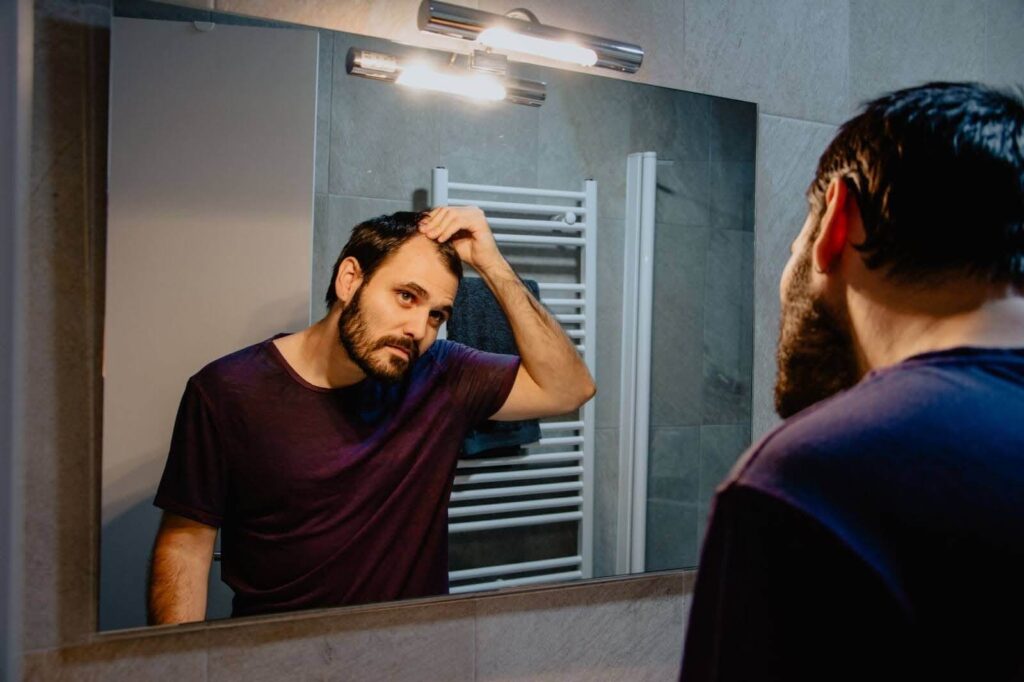When you’ve just come home after a hair transplant, you want to make sure you know how to take care of the most precious of goods: Your newly implanted hair grafts. They are still fragile and need a bit of nurturing to fully take root. At Nashville Hair Doctor, we give our hair and beard transplant patients detailed directions for home care before they leave our clinic. Here are some of the DOs and DON’Ts we like to emphasize:
How to Recover From a Hair Transplant
DO’s After a Hair Transplant
DO have someone drive you home after your procedure. Hair transplant surgery does not typically require strong sedation, but if you’ve been given a sedative, our doctor will not release you to drive under its influence. A friend or family member will have to sign you out.
DO sleep with your head elevated for the first 7 days, or however long you experience swelling. For most patients, it will only last a few days, and some may never experience swelling at all. A recliner is very useful as a makeshift bed. Just think of all the Netflix binge-watching you can accomplish while there!
DO ask your surgeon or nurse which medication is safe to take.
DO apply ice just above the eyebrows to help prevent swelling, which typically occurs on the 3rd or 4th day post-op.
DO be very gentle when washing your hair for the first 5 days, starting with Day 3. DON’T scrub too much, DON’T blast the water stream directly onto your scalp.
DO use a cup to rinse the scalp.
DO gently apply conditioner to the scalp to relieve any itching.
DO dye your hair shortly before your procedure if you feel you can’t make it for four additional weeks. Dying your hair before hair transplant surgery will not have a negative effect.
DO hydrate well before and after hair transplant surgery.
DO expect some hair to fall out from the transplanted areas about 2 to 4 weeks after your procedure. This is entirely normal and part of the natural hair growth cycle. This doesn’t mean that the follicles are damaged. Your hair will regrow within about three months.
DONT’s After a Hair Transplant
DON’T: Sleep flat on your tummy or side, or rub your new hairline against a pillow.
DON’T be alarmed if you experience swelling, especially on days 3 and 4 after the surgery.
DON’T: Apply any ice directly to the transplanted areas of your scalp. You really want to avoid touching these areas with anything.
DON’T: Try to prevent scabs from forming on your scalp. The formation of scabs is a very natural result after your scalp has been poked and prodded, and part of the natural healing process. Much like you want to keep a scab on your knee undisturbed until it is fully healed and has fallen off, you need to let the scabs on your head form freely until they go away on their own.
DON’T: Wash your hair for the first 48 hours.
DON’T: Scratch your scalp. Some itchiness is normal the first few days after a hair transplant.
DON’T: Wear any hats or ball caps for the first three days. The scabs that naturally form after a hair transplant need about three days to solidify. During this time, it is best to keep anything from touching your head. The same applies to beard transplant patients with regards to face masks – they should be avoided during this time.
DON’T: Expose your scalp to direct sunlight other than brief periods of time during the first 2 weeks. After three days, make sure you cover up with a hat. It’s very common for hair transplant patients to use vacation time for their recovery, and it’s okay to spend that time at the beach or outside, as long as you don’t run any risk of sunburn. You also shouldn’t go scuba diving.
DON’T: Engage in heavy exercise in the days following your hair transplant. You have to be careful with exertion – your blood pressure and heart rate need to stay in a safe zone until the risk of swelling has subsided. This can be tough for the gym buffs. You may have to swap pumping that iron and taking a run for some light cardio instead.
DON’T engage in any activities that might cause you to sweat heavily
DON’T: Dye your hair for four weeks after your procedure; the harsh chemicals can compromise the success of the transplanted follicles when in that initial frail state directly after transplantation.
DON’T consume alcohol for about five days after the procedure; alcohol in your system can interfere with the blood supply to the head.
DON’T smoke for a month after the surgery. Again, blood flow is important for the growth of new hair. Giving up smoking altogether would be the best course of action, if you haven’t already done so.
Hair transplant surgery is a very effective procedure that is only minimally-invasive and can have a very positive impact on your life. We hope that our tips will help you get the most out of hair restoration. If you have any other questions about hair transplants, feel free to contact Nashville Hair Doctor. To get started on your journey to new hair, request a FREE quote!

